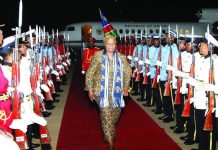Africa-Press – Namibia. FAILING AFRICAN countries will only prosper on all fronts – better quality democracy, more efficient governments, booming economies and more societal peace – when voters start to elect candidates and parties based on merit, not colour, ethnicity or past struggle history.
While the majority of Africans across the continent desperately want more efficient governments, economic prosperity and peace, the irony is that they largely do not vote for this. Many mostly vote for parties and candidates based on their role in the struggle against colonialism, apartheid and white minority regimes, ethnicity or colour, which undermines the service delivery they crave.
In almost all cases, voting based on colour, ethnicity and past struggle credentials means that competence, performance in government and honesty, as criteria, for leadership and party election, are set aside by voters. This means that candidates and parties get elected who are often corrupt, incompetent and lack moral values. However, they appeal to voters solely based on their anti-colonial and anti-apartheid struggle credentials, shared ethnicity or colour.
Once elected, they often also appoint officials to public services, state-owned enterprises (SOEs) and oversight agencies based on struggle credentials, ethnicity and colour, and not on merit. Again, those appointed in this way have no incentive to be accountable for the effective delivery of public services. They know that even if they fail in government, enough people will continue voting for the governing party and leaders who appointed them, solely because of their anti-colonial and anti-apartheid struggle credentials, shared ethnicity and colour, not on performance.
Unless voters change this anti-service delivery voting pattern, African countries will continue to elevate parties and leaders who are incompetent, corrupt and dishonest – continuing the cycle of non-delivery by governments. Corruption, poverty and social instability will continue to escalate. It is one of the main reasons why African countries plunge into an ever-continuing downward spiral of lack of accountability that often ends in failed states, civil wars and coups.
Leaders and parties elected on shared struggle credentials, ethnicity and colour have little incentive to deliver much-needed public services to the desperate voters who supported them. They know that their traditional voters will continue to vote for them based on these shared backgrounds, even if they do not deliver.
To get better service delivery outcomes, Africans will have to start voting more conscientiously – based on parties’ and leaders’ capabilities, performance and honesty. POLARISING ISSUES
In many ethnically, language and colour diverse countries, with a historical past where one group dominated and others were oppressed, both the formerly dominant and formerly oppressed often vote for candidates and parties who speak to their historically shared struggle, ethnicity and colour – rather than on their competence to deliver services. As a result, these countries also struggle to hold these governing parties and leaders accountable, because they know that their traditional voters will continue to vote for them because of historical, ethnic or colour reasons.
In its 2004 World Development Report, the World Bank pointed out that “where populations are polarised around non-service issues – religious, ethnic, caste, or tribal background, for example – voters care more about what politicians promise on these polarising issues than on services, giving politicians incentives to pursue other goals at the cost of effective services”. The sad thing is that where this happens, “politicians have neither the incentives nor the capacity to listen” after being elected.
Many voters often fail to understand just how the corruption, incompetence and poor decisions of the leaders and parties they voted for are based on struggle credentials, ethnic likeness and colour. Nor that it has a negative impact on the delivery of public services, the lack of societal peace and continuing poverty. In fairness, in many cases, of course, voters just do not have the information about how the decisions, incompetence and corruption of parties and leaders they have voted for negatively affect them.
Many African political parties and politicians encourage voting based on struggle credentials, ethnicity and colour, because it propels them into power, with all the trappings that it brings: the power to control the state, manipulate the law for self-enrichment, and get tax-funded luxury living without being held accountable by the people who voted for them.
Unless Africa’s voters start electing candidates and parties based on merit, their record in power and their probity, they will not get the public services they desperately need and deserve. They may never get quality public services in their lifetime because the same corrupt, incompetent and dishonest politicians and parties will be elected over and over again.
* William Gumede is associate professor, School of Governance, University of the Witwatersrand and author of ‘Restless Nation: Making Sense of Troubled Times’ (Tafelberg)
For More News And Analysis About Namibia Follow Africa-Press






